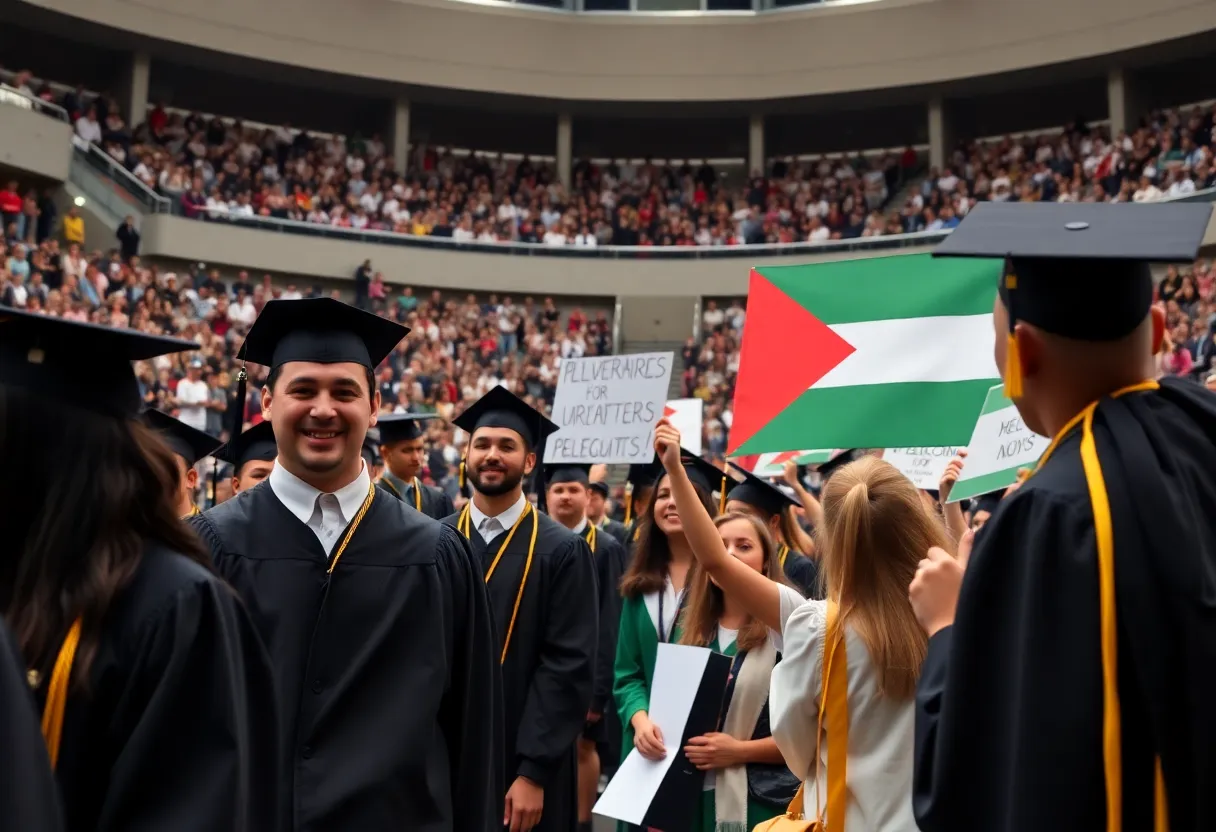

Students at MIT's commencement express mixed reactions during a controversial speech.
Want to target the right audience? Sponsor our site and choose your specific industry to connect with a relevant audience.
Prominent brand mentions across targeted, industry-focused articles
High-visibility placements that speak directly to an engaged local audience
Guaranteed coverage that maximizes exposure and reinforces your brand presence
Interested in seeing what sponsored content looks like on our platform?
May’s Roofing & Contracting
Forwal Construction
NSC Clips
Real Internet Sales
Suited
Florida4Golf
Click the button below to sponsor our articles:
Sponsor Our ArticlesMegha M. Vemuri, class president of MIT’s Class of 2025, sparked controversy at the OneMIT commencement with a pro-Palestinian speech. Vemuri accused MIT of complicity in violence against Palestinians and faced a divided audience reaction. After her speech, she was informed she would not graduate due to claims of misleading organizers. This incident raises important questions about freedom of speech and the delicate balance universities must strike amidst political activism.
In a surprising turn of events at the OneMIT commencement ceremony, Megha M. Vemuri, the class president of MIT’s Class of 2025, found herself at the center of a heated controversy. Vemuri took to the stage on Thursday to deliver a pro-Palestinian speech that has since sparked a wave of reactions among her fellow graduates and attendees.
During her speech, Vemuri didn’t shy away from making pointed accusations against the institution she represents. She stated that MIT is complicit in what she described as the genocide of Palestinians, declaring that “we are watching Israel try to wipe Palestine off the face of the Earth,” and expressing disappointment that MIT is playing a role in this situation.
Vemuri took a moment to commend her classmates, recognizing their efforts in protesting against Israel following the events of October 7, which marked the beginning of the conflict that has escalated into the current Gaza War. She also brought to light MIT’s connections with the Israeli military, claiming that the Israeli forces are the only foreign military with which the university has research ties, framing this as a significant issue of ethical responsibility.
The response from the audience was far from uniform. As Vemuri spoke, some attendees chose to walk out, while others voiced their discontent by chanting “Shame.” Yet, there were also those who applauded her words, indicating a clear division among the attendees regarding her message. Adding to the chaotic atmosphere, an individual waved a Palestinian flag and got into a scuffle with security personnel during Vemuri’s speech.
After the conclusion of her address, Vemuri was informed that she would not be allowed to graduate the following day, a decision that left many shocked. According to an MIT spokesperson, the action was taken due to claims that Vemuri misled Commencement organizers and disrupted the event with her ‘unapproved’ speech. This situation has not only raised eyebrows but also sparked discussions about freedom of speech and the lengths institutions will go to maintain order during ceremonial events.
In light of the incident, MIT President Sally Kornbluth chose to focus on the values of scientific inquiry during her remarks, avoiding any mention of the disruption stirred by Vemuri. It’s important to note that this isn’t just an isolated incident; Vemuri is one of several students across various universities facing repercussions for politically charged speeches during graduation ceremonies. This reflects a broader trend where universities are grappling with student activism, especially regarding the contentious Israel-Palestine issue.
Vemuri underscored the overwhelming support from both the undergraduate body and graduate student union, who previously voted to cut ties with what she described as the “genocidal Israeli military.” Her speech finished with an impassioned call for graduates to continue lifelong advocacy against injustices linked to their university’s relationships and research initiatives. She specifically called for arms embargoes and emphasized the necessity of humanitarian aid.
Throughout her speech, Vemuri donned a keffiyeh, a traditional emblem of Palestinian solidarity, which further highlighted the intense emotions surrounding her message. In the aftermath, one anonymous Israeli student expressed his disappointment, sharing that many Jewish families left the ceremony feeling unsettled by the division that had surfaced.
As this heated situation develops, it serves as a reminder of the delicate balance universities must navigate between fostering free speech and addressing the resulting tensions among their communities. Vemuri’s speech and the university’s response illustrate just how deeply the ongoing Gaza conflict has permeated academic settings, leaving students to reckon with their responsibilities in times of political strife.
}
News Summary Brad Sigmon was executed by firing squad in South Carolina, marking the first…
News Summary South Carolina faced an unexpected winter weather event as snow flurries affected the…
News Summary South Carolina has faced a tragic week marked by multiple deadly accidents on…
News Summary South Carolina has confirmed its first case of measles for the year, involving…
News Summary The South Carolina Festival of Discovery saw over 10,000 attendees in Uptown Greenwood,…
News Summary The city of Greenwood celebrated its culinary heritage at the 24th Annual Festival…